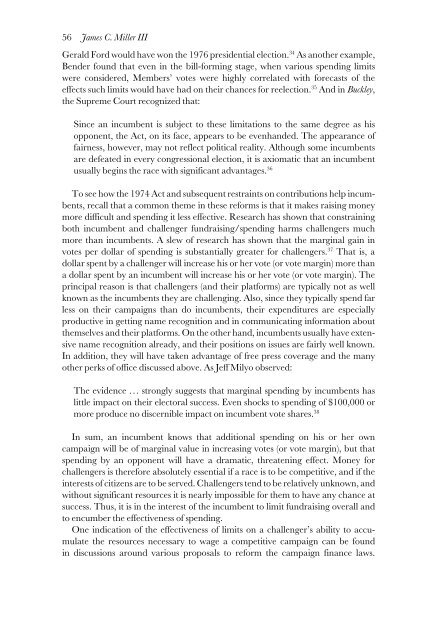Money and Markets: Essays in Honor of Leland B. Yeager
Money and Markets: Essays in Honor of Leland B. Yeager
Money and Markets: Essays in Honor of Leland B. Yeager
You also want an ePaper? Increase the reach of your titles
YUMPU automatically turns print PDFs into web optimized ePapers that Google loves.
56 James C. Miller IIIGerald Ford would have won the 1976 presidential election. 34 As another example,Bender found that even <strong>in</strong> the bill-form<strong>in</strong>g stage, when various spend<strong>in</strong>g limitswere considered, Members’ votes were highly correlated with forecasts <strong>of</strong> theeffects such limits would have had on their chances for reelection. 35 And <strong>in</strong> Buckley,the Supreme Court recognized that:S<strong>in</strong>ce an <strong>in</strong>cumbent is subject to these limitations to the same degree as hisopponent, the Act, on its face, appears to be evenh<strong>and</strong>ed. The appearance <strong>of</strong>fairness, however, may not reflect political reality. Although some <strong>in</strong>cumbentsare defeated <strong>in</strong> every congressional election, it is axiomatic that an <strong>in</strong>cumbentusually beg<strong>in</strong>s the race with significant advantages. 36To see how the 1974 Act <strong>and</strong> subsequent restra<strong>in</strong>ts on contributions help <strong>in</strong>cumbents,recall that a common theme <strong>in</strong> these reforms is that it makes rais<strong>in</strong>g moneymore difficult <strong>and</strong> spend<strong>in</strong>g it less effective. Research has shown that constra<strong>in</strong><strong>in</strong>gboth <strong>in</strong>cumbent <strong>and</strong> challenger fundrais<strong>in</strong>g/spend<strong>in</strong>g harms challengers muchmore than <strong>in</strong>cumbents. A slew <strong>of</strong> research has shown that the marg<strong>in</strong>al ga<strong>in</strong> <strong>in</strong>votes per dollar <strong>of</strong> spend<strong>in</strong>g is substantially greater for challengers. 37 That is, adollar spent by a challenger will <strong>in</strong>crease his or her vote (or vote marg<strong>in</strong>) more thana dollar spent by an <strong>in</strong>cumbent will <strong>in</strong>crease his or her vote (or vote marg<strong>in</strong>). Thepr<strong>in</strong>cipal reason is that challengers (<strong>and</strong> their platforms) are typically not as wellknown as the <strong>in</strong>cumbents they are challeng<strong>in</strong>g. Also, s<strong>in</strong>ce they typically spend farless on their campaigns than do <strong>in</strong>cumbents, their expenditures are especiallyproductive <strong>in</strong> gett<strong>in</strong>g name recognition <strong>and</strong> <strong>in</strong> communicat<strong>in</strong>g <strong>in</strong>formation aboutthemselves <strong>and</strong> their platforms. On the other h<strong>and</strong>, <strong>in</strong>cumbents usually have extensivename recognition already, <strong>and</strong> their positions on issues are fairly well known.In addition, they will have taken advantage <strong>of</strong> free press coverage <strong>and</strong> the manyother perks <strong>of</strong> <strong>of</strong>fice discussed above. As Jeff Milyo observed:The evidence . . . strongly suggests that marg<strong>in</strong>al spend<strong>in</strong>g by <strong>in</strong>cumbents haslittle impact on their electoral success. Even shocks to spend<strong>in</strong>g <strong>of</strong> $100,000 ormore produce no discernible impact on <strong>in</strong>cumbent vote shares. 38In sum, an <strong>in</strong>cumbent knows that additional spend<strong>in</strong>g on his or her owncampaign will be <strong>of</strong> marg<strong>in</strong>al value <strong>in</strong> <strong>in</strong>creas<strong>in</strong>g votes (or vote marg<strong>in</strong>), but thatspend<strong>in</strong>g by an opponent will have a dramatic, threaten<strong>in</strong>g effect. <strong>Money</strong> forchallengers is therefore absolutely essential if a race is to be competitive, <strong>and</strong> if the<strong>in</strong>terests <strong>of</strong> citizens are to be served. Challengers tend to be relatively unknown, <strong>and</strong>without significant resources it is nearly impossible for them to have any chance atsuccess. Thus, it is <strong>in</strong> the <strong>in</strong>terest <strong>of</strong> the <strong>in</strong>cumbent to limit fundrais<strong>in</strong>g overall <strong>and</strong>to encumber the effectiveness <strong>of</strong> spend<strong>in</strong>g.One <strong>in</strong>dication <strong>of</strong> the effectiveness <strong>of</strong> limits on a challenger’s ability to accumulatethe resources necessary to wage a competitive campaign can be found<strong>in</strong> discussions around various proposals to reform the campaign f<strong>in</strong>ance laws.
















